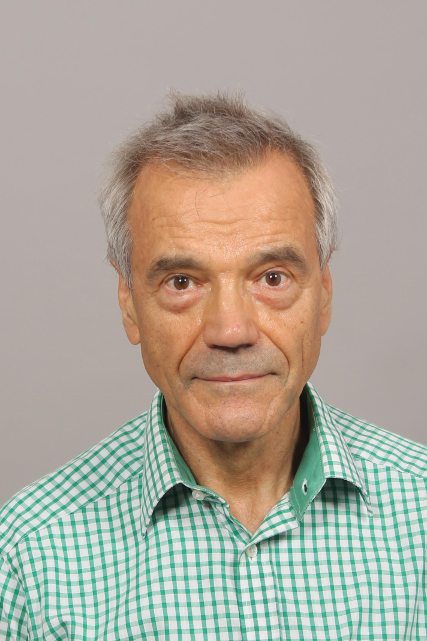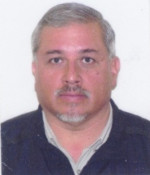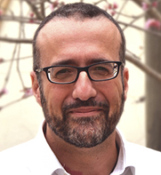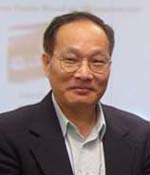Confirmed speakers
 |
Leiden Institute of Advanced Computer Science, Leiden University, Netherlands |
|
 |
Instituto de Matemáticas, UNAM, México |
|
 |
Baja California University and ITT Professor, Tijuana Red Cross | |
 |
Information Management School, Universidade Nova de Lisboa, Portugal |
|
 |
School of Engineering, University of California Merced, US |
Featured talk
On Steering Dominated points in hypervolume gradient ascent for Bicriteria Continuous Optimization
Abstract
Bio
Research Interests
The current research focus of Dr.André Deutz is Multiobjective Optimization, also in the light of Natural Computing, more specifically Indicators and Multiobjective Optimization (and its generalizations such as Diversity oriented Optimization); secondly Geometric Algebra and its applications to Multiobjective Optimization and Quantum Computation.
Education
André studied pure mathematics at the University of Amsterdam, specialization Algebraic Geometry (MSc cum laude). He wrote a doctoral thesis on Algebraic Topology at Wayne State University and UCLA. Subsequently he was invited by the Mathematical Association of America to participate in a 14-months study of Computer Science for ph.d. mathematicians. Furthermore he studied Computer Science at Cornell University (MSc).
Teaching
Dr. Deutz has taught most of the courses of the standard curriculum of undergraduate Computer Science. He also taught graduate courses. Currently he is teaching Computer Systems for undergraduates and Quantum Computing for master level students.
Grants
Fulbright grant (1977-1981), MAA invitation to study Computer Science (1984-1985), Dana Grant at Cornell University (1987-1988), Several Development Grants,
Publications
[1] M. Emmerich, A. Deutz, O. Schutze, Th. B ̈ack, E. Tantar, A.-A. Tantar, P. Del Moral, P. Legrand, P. Bouvry, and C.A. Coello Coello, editors. EVOLVE - A Bridge between Probability, Set Oriented Numerics, and Evolutionary Computation IV International Conference Held at Leiden University, July 10-13 2013, XIV, 324 p. 140 illus., volume Vol. 227 of Advances in Intelligent Systems and Computing, Berlin Heidelberg, May 2013. Springer.
[2] Michael Emmerich and André Deutz, editors. EVOLVE 2013 - A Bridge Between Probability. Set Oriented Numerics, and Evolutionary Computation - Short Paper and Extended Abstract Proceedings. LIACS, Leiden University, July 2013.
[3] Michael Emmerich and André Deutz. Time complexity and zeros of the hypervolume indicator gradient field. In Oliver Schutze, Carlos A. Coello Coello, Alexandru-Adrian Tantar, Emilia Tantar, Pascal Bouvry, Pierre Del Moral, and Pierrick Legrand, editors, EVOLVE - A Bridge
between Probability, Set Oriented Numerics, and Evolutionary Computation III, volume 500 of Studies in Computational Intelligence, pages 169–193. Springer International Publishing, 2014.
[4] Michael Emmerich, André Deutz, and Johannes Kruisselbrink. On quality indicators for black-box level set approximation. In E. Tantar et al., editor, EVOLVE- A Bridge between Probability, Set Oriented Numerics, and Evolutionary Computation, volume 447 of SCI, pages 157–185. Springer, 2013.
[5] Michael Emmerich, André Deutz, Johannes Kruisselbrink, and Edgar Reehuis. Evolutionary level set approximation. In EVOLVE 2012, A Bridge between Probability, Set-oriented Numerics, and Evolutionary Computation. Cinvestav, 2012.
[6] Michael Emmerich, André Deutz, and Iryna Yevseyeva. On reference point free weighted hypervolume indicators based on desirability functions and their probabilistic interpretation. In CENTERIS. Elsevier, 2014.
[7] Michael Emmerich, André H. Deutz, Johannes W. Kruisselbrink, and Pradyumn Kumar Shukla. Cone-based hypervolume indicators: Construction, properties, and efficient computation. In Robin C. Purshouse, Peter J. Fleming, Carlos M. Fonseca, Salvatore Greco, and Jane Shaw, editors, EMO, volume 7811 of Lecture Notes in Computer Science, pages 111–127. Springer, 2013.
[8] Michael T. Emmerich, André H. Deutz, and Jan Willem Klinkenberg. Hypervolume-based expected improvement: Monotonicity properties and exact computation. In IEEE Congress on Evolutionary Computation, CEC 2011, New Orleans, LA, USA, 5-8 June, 2011, pages 2147–
2154. IEEE, 2011.
[9] Pradyumn Kumar Shukla, Michael Emmerich, and André H. Deutz. A theoretical analysis of curvature based preference models. In Robin C. Purshouse, Peter J. Fleming, Carlos M. Fonseca, Salvatore Greco, and Jane Shaw, editors, EMO, volume 7811 of Lecture Notes in Computer Science, pages 367–382. Springer, 2013.
Featured Talk
Applied Optimization to Big Scale
Abstract
Bio
Research Interests
His research interests include the theory and applications of Operations Research and Combinatorics; developing models and methods -both exact and heuristic- to solve various optimization problems in Physics, Biochemistry, Finance, and Political Sciences, as well as in Industrial, Chemical and Electrical Engineering.
Education
Dr. Romero graduated as Civil Engineer from the National Autonomous University of Mexico (UNAM). He studied Computer Sciences at the University of Liege, Belgium, and earned his PhD in Applied Mathematics (Operations Research) at the University of Grenoble, France. Later, he spent some exchange time at the Polytechnic of Central London, England. He currently serves as a full-time researcher at the Institute of Mathematics, UNAM, in Cuernavaca, Mexico.
Dr. Romero has published over 50 research papers, receiving more than 400 citations, which include those by Kenneth Arrow, 1972 Nobel laureate in Economics. He has delivered about 100 lectures in conferences, has taught 90 courses, mostly at graduate level, and has participated in the organization of 50 academic meetings. His career includes positions as a researcher at the Institute of Electrical Research, Cuernavaca, Mexico, and the University of Ottawa, Canada.
He was General Director in INEGI, Mexico, and Head of the Cuernavaca branch of the Institute of Mathematics, UNAM. Dr. Romero has participated in projects that require the development of mathematical models and methods, to provide scientific basis to the decision making process in various public and private institutions.
Dr. Romero is member of the Mexican System of Investigators (SNI Level III).
Featured Talk
Big Data science in medicine and biomedical research
Bio
Dr. Carlos Vera Hernandez is researcher professor at the Medicine and Psychology Faculty of the Baja California University (UABC), support professor at Tijuana Technology Institute (ITT), and Instructor at the program COSMOS (California Sumemr School for Mathematics and Science) of Engineering School of University of California (UCSD).
Education
His education includes: Industrial Engineering on Electronics (ITT,1985), Mathematics over Computation specialty (ITT, 1987), General Medicine (UABC, 1995), Master, PhD, and Post-PhD on Molecular Bioengineering (UCSD, 1996-2010). In 2007, thanks to a grant from the New York Carnagie Corporation, he received an expert training on bioterrorism at the Institute on Global Conflict and Cooperation (USCD).
Research Interests
His academical research has been focused on the molecular bases elucidation of the eritrocitaric membrane biomechanics, its mathematical model, and its biomedical application.
Professional activities
Additionally, he has worked on the planning of major emergencies and disasters as well as the operative area. During the Mexico 1985 earthquake, he was Chief of Operations for Urban Rescue of the Halcones Rescue Group. He has been Subdirector for Civil Protection for Tijuana city (1992-1997). He was the founder of the State Group for Major Emergencies Response (1998-2002), founder of the Training and Standarization Committee of the Prehospital Services for First-aid and Rescue (2002), Disasters Coordinator (2003-2005) and Tijuana Red Cross First-aid Coordinator (2013-2014). His main concern in this area is the promotion of the continuous education to the operative personnel and the optimization of the response and planning during major emergencies or disasters.
Featured Talk
Geometric Semantic Genetic Programming
Abstract
Bio
Education
Leonardo Vanneschi was born in Florence (Italy) on October 3rd, 1970. He took his University degree (Laurea) in Computer Science by the University of Studies of Pisa (Italy) in 1996 (110/110 summa cum Laude) and his PhD in Computer Science by the University of Lausanne (Switzerland) in 2004 (PhD thesis honoured with the Excellence Award of the Science Faculty of the University of Lausanne). He is an Associate Professor at NOVA Information Management School (NOVA IMS) of the Universidade Nova of Lisbon, Portugal.
Research Interests
His main research interests are: Machine Learning, study of Complex Systems, Data Mining, and in particular Evolutionary Computation.
Research scope
His theoretical studies on the foundations of Evolutionary Computation, as well as his applicative works, covering several fields among which Computational Biology and Image Processing, have been consistently recognized and appreciated by the international community from 2000 to nowadays. He is a member of the editorial board of two international scientific journals. He is a member of the steering committee and program committee of various international conferences. He has been the editor of several international conference proceedings and of two scientific journals special issues. In 2015 he has received an Award for Outstanding Contributions in Evolutionary Computation from a panel of internationally renowned experts. He has about 150 scientific publications, among which 11 have been honoured with international awards.
Honors and awards
April 2015: Award for Outstanding Contributions in Evolutionary Computation.
April 2014: EuroGP 2014 Best Paper Award [1].
April 2013: EuroGP 2013 Best Paper Award [2].
April 2011: EvoBIO 2011 Best Paper Award [3].
September 2009: ICEC 2009 Best Paper Award [4].
June 2007: GECCO 2007 Best Paper Award, Genetic Algorithms track [5].
June 2006: GECCO 2006 Best Paper Award, Biological applications track [6].
April 2006: EuroGP 2006 Best Paper Award [7].
April 2005: EuroGP 2005 Best Paper Award [8].
September 2002: PPSN 2002 Best Poster Award [9].
July 2002: GECCO 2002 Best Graduate Student Paper Award [10].
June 2005: Excellence Award from the Science Faculty of the University of Lausanne [11].
Publications
[1] S. Ruberto, L. Vanneschi, M. Castelli, and S. Silva, "ESAGP – A semantic GP framework based on alignment in the error space," in 17th European Conference on Genetic Programming (M. Nicolau, K. Krawiec, M. I. Heywood, M. Castelli, P. Garci-Sanchez, J. J. Merelo, V. M. R. Santos, and K. Sim, eds.), vol. 8599 of LNCS, (Granada, Spain), pp. 150–161, Springer, 23-25 Apr. 2014.
[2] L. Vanneschi, M. Castelli, L. Manzoni, and S. Silva. A new implementation of geometric semantic gp and its application to problems in pharmacokinetics. In Genetic Programming (K. Krawiec, A. Moraglio, T. Hu, A. Etaner-Uyar, and B. Hu, eds.), vol. 7831 of Lecture Notes in Computer Science, pp. 205–216, Springer Berlin Heidelberg, 2013.
[3] A. Farinaccio, L. Vanneschi, P. Provero, G. Mauri, and M. Giacobini. A new evolutionary gene regulatory network reverse engineering tool. In C. Pizzuti, et al., editors, EvoBio, volume 6623 of Lecture Notes in Computer Science, pages 13–24. Springer, 2011.
[4] L. Vanneschi and G. Cuccu. A study of genetic programming variable population size for dynamic optimization problems. In A. Rosa et al., editor, Proceedings of the 2009 International Conference on Evolutionary Computation (ICEC 2009), part of the International Joint Conference on Computational Intelligence (IJCCI 2009), 2009.
[5] R. Poli and L. Vanneschi. fitness-proportional negative slope coefficient as a hardness measure for genetic algorithms. In D. Thierens et al., editor, Proceedings of the Genetic and Evolutionary Computation Conference, GECCO 2007, volume 2, pages 1335 – 1342. ACM Press, 2007.
[6] F. Archetti, S. Lanzeni, E. Messina, and L. Vanneschi. Genetic programming for human oral bioavailability of drugs. In M. Keijzer et al., editor, Proceedings of the Genetic and Evolutionary Computation Conference, GECCO 2006, volume 1, pages 255–262. ACM Press, 2006.
[7] L. Vanneschi, S. Gustafson, and G. Mauri. Using subtree crossover distance to investigate genetic programming dynamics. In Collet, P., et al., editor, Genetic Programming, 9th European Conference, EuroGP2006, Lecture Notes in Computer Science, LNCS 3905, pages 238–249. Springer, Berlin, Heidelberg, New York, 2006.
[8] S. Gustafson and L. Vanneschi. Operator-based distance for genetic programming: Subtree crossover distance. In Keijzer, M., et al., editor, Genetic Programming, 8th European Conference, EuroGP2005, Lecture Notes in Computer Science, LNCS 3447, pages 178–189. Springer-Verlag, Heidelberg, 2005.
[9] M. Tomassini, L. Vanneschi, F. Fernández, and G. Galeano. Experimental investigation of three distributed genetic programming models. In J. J. Merelo, P. Adamidis, H. G. Beyer, J.-L. Fernández-Villacanas, and H.-P. Schwefel, editors, Parallel Problem Solving from Nature PPSN VII, volume 2439 of Lecture Notes in Computer Science, pages 641–650. Springer-Verlag, Heidelberg, 2002.
[10] L. Vanneschi and M. Tomassini. A study on fitness distance correlation and problem difficulty for genetic programming. In Alwyn Barry, editor, 2002 Genetic and Evolutionary Computation Conference, Workshop Program Proceedings, GECCO'02, pages 307–310, New York City, USA, 2002.
[11] L. Vanneschi. Theory and Practice for Efficient Genetic Programming. Ph.D. thesis, Faculty of Science, University of Lausanne, Switzerland, 2004.
Featured Talk
Multi-Objective Optimal Design of Nonlinear Controls
Abstract
Bio
Education
Dr. Jian-Qiao Sun earned his PhD from University of He worked for Lord Corporation at their Corporate R&D Center in Cary, North Carolina, and since engaged in smart materials research and applications, and acoustic-structural controls. In 1994, Dr. Sun jointed the faculty of the department of Mechanical Engineering at the University of Delaware as an Assistant Professor, was promoted to Associate Professor in 1998 and to Professor in 2003.
Teaching
He is currently a professor in School of Engineering at University of California, Merced.
Research Scope
He was an Associated Editor of ASME Journal of Vibration and Acoustics since 1994 to 2000, and was an Associated Editor of Communications in Nonlinear Science and Numerical Simulations from 2001 to 2012, an Editorial Board Member of Acta Mechanica Solida Sinica from 2003-2012, an Editorial Board Member of Journal of Vibration and Control since 2005 and Journal of Sound and Vibration since 2006. From October 2012, he started serving as the founding Editor-in-Chief of International Journal of Dynamics and Control published by Springer.
Research Interests
His research interests include cell mapping methods, multi-objective optimization, nonlinear random vibrations, nonlinear controls, active structural-acoustic control, stochastic systems, modeling and physical therapy applications of smart materials, time-delayed dynamical systems, and optimal HVAC control and fault detection of energy efficiency of office buildings.
Current Research
Data-driven Modeling and Analysis of Building HVAC Systems for Fault Detection and Optimization
Multi-objective Optimal Control Design
Cell Mapping Methods

